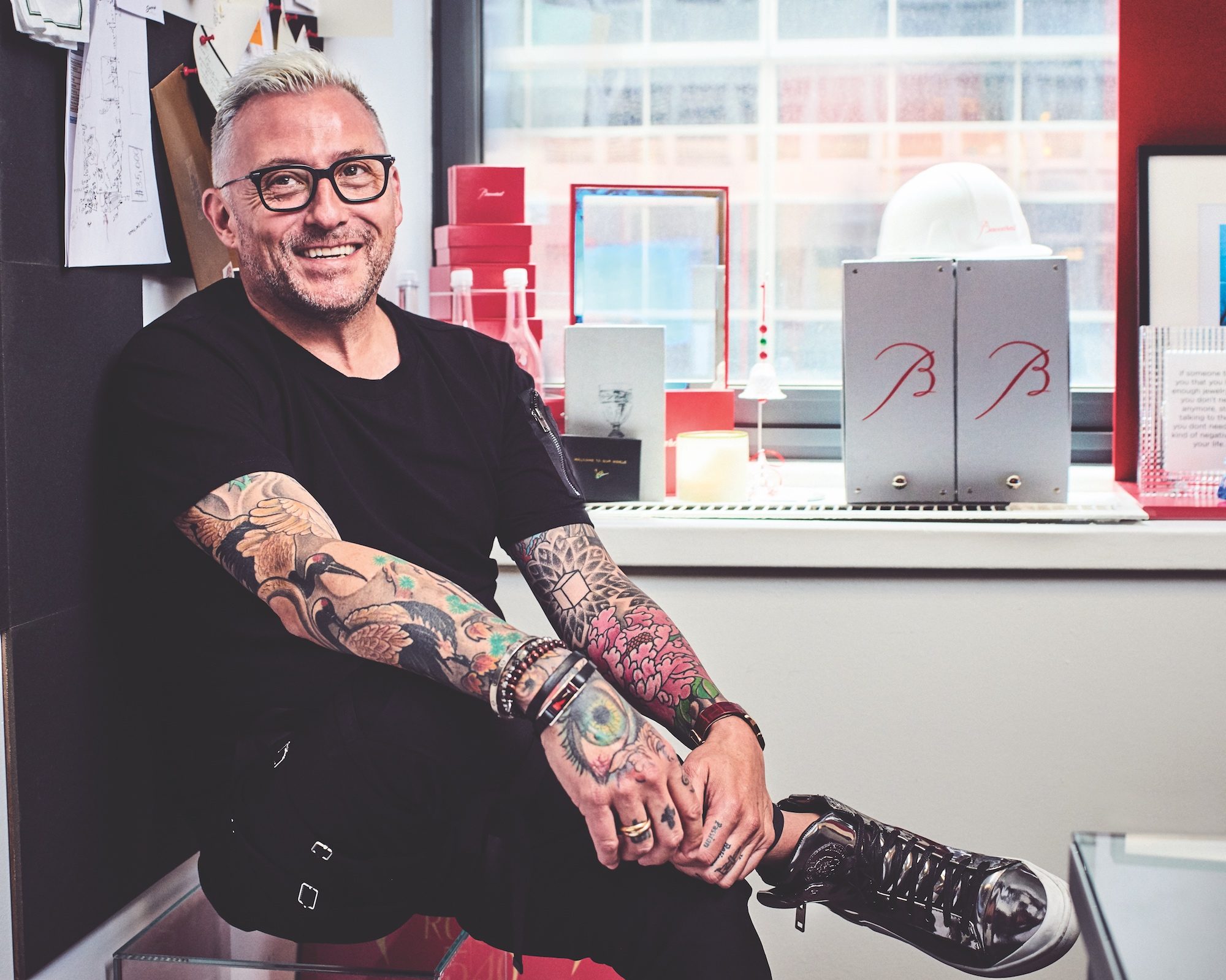You have more tattoos than I expected to see on someone who works at a 250-year-old French crystal maker.
It was probably my first midlife crisis.
How old were you when you started getting them?
Forty-four.
Wow.
My partner and I were in Amsterdam. We had tickets to the Anne Frank Museum, and out of the blue he’s like, “Let’s get tattoos!” Instead of going to the museum, we got tattoos.
Do you have a favorite?
The most special one is from when my mother and I got matching tattoos for her 72nd birthday. It was her first and only.
You must stand out at Baccarat.
The juxtaposition has really worked. I’m pretty old fashioned—I’m in bed by 10 p.m. every night even though my boss always wants me to go out and party with her—but I look modern and how I approach the business is modern.
You joined the company in early 2016. How did you land there?
The global CEO at Baccarat [Daniela Riccardi] was my boss at Diesel, where I worked for five years. When I left, she told me I was too young to retire, and that I should join her. So here I am.
Why did you think it would be a good fit?
I love to set a table. My partner and I throw dinner parties. I cook, but I also love the presentation.
What are your go-to dishes for a dinner party?
I always start with gazpacho, which I serve in Bernardaud espresso cups—though I’m thinking of changing that. I don’t do dessert ever. I cannot bake to save my life.
Has hosting influenced your work at Baccarat?
Before I joined the company, I was looking for champagne flutes, and my partner suggested Baccarat, and I said, “But you can get that at Macy’s.” So, one of my first missions here was to get out of Macy’s. We didn’t just stop shipping. We bought everything back because I didn’t want it to go on sale. We’ve really cleaned up the distribution.
It’s a tough moment for retail right now.
The traditional home stores are dying. Now we’re in apparel stores like Martin Patrick 3, a men’s store in Minnesota—it’s the greatest men’s store in the world, in my opinion. We sold them Baccarat because men—heterosexual men—are never going to walk into the home store where their wife once registered for their wedding. At least not alone. But at a men’s store, you’re sitting there buying a suit, and I show you a glass to drink your scotch, and you’re going to be like, “Great. I’ll take six.”
Has that born out in sales?
Extremely.
You’ve had a good year and a half?
We’re very pleased.
It’s a moment of transition for the company: it’s changing ownership, it recently opened a notoriously luxe hotel. Where are you putting your energy?
We need to broaden our customer base. I don’t care if someone’s a millennial, a Gen X, a Gen Y, if they’re green, yellow, or blue, if they sleep with whatever. Our customers are people who like nice things. When I think about markets that we have zero penetration in, it’s Silicon Valley and Seattle.
I’ve also been traveling around the U.S. and explaining why people should use Baccarat every day. We wear nice watches every day. We spend money on shoes that we get dirty on the streets of New York City. We wear our clothes and we mix high and low. But in the home we don’t do that. We have the good crystal, the good silver, the china that we use on Passover and Christmas. Otherwise we have the Crate and Barrel that we got the year we graduated from college.
When I got this job, I threw out—well, put in storage—all my glasses, and the only thing I use is crystal. I can’t give the message unless I live the life.
How do you teach retailers to sell that idea?
I grew up at Nordstrom in the late ’80s. One-hundred percent of my salary was commission, and I made a very good living. I think we’ve developed a world of clerks. A good salesperson has to edit the collection for a customer. We need to teach them the information they can’t find on the internet. Can I tell you about lead crystal? Can I tell you about this [holds up a tumbler], and why it’s so clear, and why it’s so heavy and balanced? You can’t feel that on the internet. That said, our internet growth is explosive. But people learn about the brand in the store.
Beyond the bottom line, what are your ambitions in this role?
I would like us to have an impact on the industry and to change the way people think about what we use at home. I really don’t understand why we aren’t using this stuff more.

